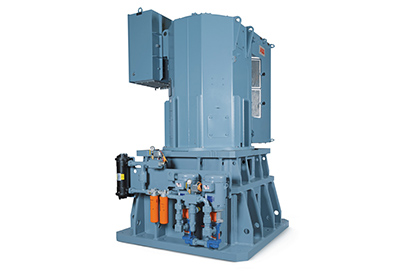Meet Daniel Cotton, Vice-President, Motion Business for ABB in Canada

March 10, 2020
By Blake Marchand
Daniel Cotton began his career with ABB in 1989, where he remained until 1993 and returned to in 2007. In between, he led teams in multiple positions including marketing, sales and project management at GE. In 2014, Daniel took on the role of Vice President, Motion business for ABB in Canada.
During his tenure, Cotton brought Baldor Motors, ABB Drives and Dodge Mechanical Products together to make up ABB Drives and Motors business. Combined, these businesses form ABB Motion, creating synergies between product lines and streamlining processes across the board.
Throughout his interview with Drives & Control Solutions, Cotton discusses trends within the industry, his appreciation for ABB’s focus on developing employees, and the characteristics that have been key to his success.
What are some of the recent industry trends or developments that have had an affect on what ABB Motion is doing?
There are two mega-trends – the first one is the Energy Revolution; and the second one is the Industrial Revolution, or what we call Industry 4.0. These revolutions govern ABB as a whole – the solutions we offer, the training we provide as well as the structure we’ve adopted. The Motion business is no different than the rest of the company.
The Energy Revolution is focused on efficiency. Motors represent about one-third of energy consumed in the world; working towards increasing their efficiency and providing those resources to others is our goal, and it influences the way we work. In the years to come, digitalization and other advanced technologies such as artificial intelligence will provide the basis of a sustainable market. When you look at the efficiency of your motor and how it can be combined with the drive to make sure you use the motor at its optimal point, the savings and productivity of a customer can dramatically improve – that’s what my team strives to make happen every day.
The second trend, the Industrial Revolution, is what drives our digital mindset. Throughout ABB, it’s all about connectivity: How do you combine automation, big data, artificial intelligence, even smart devices together? How can you leverage the information you have and the information that is derived from these tools? How can you transform data into insights for smart decisions? This what our ABB Ability service answers. It has the unique ability to connect the various aspects of businesses to help our customers embrace Industry 4.0.
Those are really the two places where the industry is going. It is also governing the transformation of ABB. If you look at the way ABB communicates to the market, our ABB Ability service is really taking our company, an engineering company, into the digital era. Not only digital for our customers, but also digital in the way we operate, and how we interact with our suppliers and vendors.
Customers are looking for a partner that can be more granular, specific, and more segment oriented to cater to them and their needs. If you talk to a customer in the Water and Wastewater market compared the Oil and Gas market, they expect to have personalized approaches with a focused on what they do and what they look for is features and functionalities that will be dedicated to them. Our business has positioned itself to be able to do just that.
What this allows us to do, when combined with the changes from the Energy and Industrial revolutions, is ask ourselves: ‘How do we become more agile and present a solution that is catered to our various segments and ready for the future?’
In terms of the future of your industry – whether it’s technological innovations or the broader industry in general – what are you focusing on?
At this point in time, it’s speed. We hear so often these days that change is coming faster than ever. Determining how fast we can react and provide the next best solution is, both, our greatest challenge and biggest opportunity. If you look at what it means for ABB Motion in Canada, it means looking at the three trends of connectivity: wireless support, remote diagnostics, and process improvement. Knowing this gives us the opportunity to provide the superior customer experience that we’re known for. It’s the ease of using the product and the ease of implementing the systems in their applications.
As an example – for the first trend of wireless support – you can look at what we’re doing with drives. A technician/electrician can go in front of the drive to configure it. They may not have any knowledge on how to configure an ABB drive. That’s when, via an App, it reaches an ABB technician and the technician will say ‘connect me via Bluetooth to your drive and I’ll see what your parameters are’. The technician can then describe the problem, say ‘okay I think this parameter and this parameter need to be adjusted, I’m sending you those parameters and you can accept to upload them into the drive with a press of a button.’
This is where its going and it’s phenomenal. Instead of having technicians traveling around the world, in a couple of years from now, a good portion of those travels will become a simple connection via a smart phone or tablet to an expert service centre at ABB and we’ll be able to do remote diagnostics of the equipment.
That example also touches on the next focus of our connectivity goals: remote diagnostics. You can now connect to the equipment remotely and look at the performance of your equipment right away. With the click of a button, you can see how your product is aging, if there is any maintenance required, if it requires servicing, things like that.
The third trend, and arguably the most important, will be process performance improvement. If you have your motor, drive, and bearings connected, you can monitor the vibration, the temperatures, and other factors presented to you in easy to read graphs. What this means is you can really perform miracles in terms of optimizing the system. That’s why I’m so passionate about Motion’s ABB Ability service and our Digital Powertrain offering.
What are the challenges of a manager in the current industry landscape? What are you focusing on to ensure ABB Motion remains competitive moving forward?
Our people and getting them ready. Yes, the product itself, the programming, the device, knowing the features and how they all connect present a big challenge, but the biggest focus is the people side. Training, retaining and empowering our people is what I strive to ensure within ABB Motion.
A great challenge across the industry and within our team is that we’re dealing with multiple generations coming together. We are hiring new employees which are coming in digitally savvy – but we still have more experienced people who have a great depth of valuable knowledge but are more familiar with equipment that is in the last stretch of its existence. The hurdle we try to pass is creating that synergy to make the transfer of wisdom between both generations of people while implementing new knowledge into our operations.
This is, today, what is most challenging for a manager. However, I welcome this challenge and have fun with it. At the end of the day, you’re dealing with human beings who have feelings, emotions, opinions and there’s truly nothing more rewarding than that.
We need to be curious, tenacious and forward-thinking but our job is also to make sure ABB remains a great place to work. We strive to create an environment where people of different generations can come to work, be engaged, and be proud to say, ‘we work for ABB!’. Just recently Forbes announced ABB Canada as one of Canada’s top employers for the fourth year in a row. I want to continue this trend for the future.
What are some of the areas that you focus on with respect to your own success within the industry? What advice would you have for an ambitious young professional in your industry?
The first element is tenacity and resilience. I think this is key in any leadership role, regardless of the industry. People look to you, in good time and bad, to provide guidance and it’s your responsibility to push forward, even when things seem impossible.
The second element would be, stay curious and stay informed. Demonstrating interest and passion goes a long way.
The third element is to focus on is people and respect. You can’t do it alone and you definitely can’t force your way through. You need to explain it, you need to listen to the people, you need to respect them – and if you wrap this around a level of energy and rhythm, then you’re in business.
My saying in life is ‘nothing is free’. I am not saying that because I work in sales, but rather because everything comes with a price – and that price is effort. If you want something in life, you have to work for it and that’s something my team and I do relentlessly every day.




